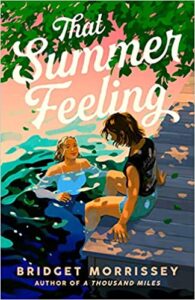Buy this from Bookshop.org to support local bookstores and the Lesbrary!
I will admit that the cover really influenced me in picking this one up. I think it’s stunning. But I’m glad I did!
Tilly is only non-artist in a house of passionate artists, and she’s always felt left out. Her parents don’t really understand her, and they also have never seemed very enthusiastic about being parents. (I had to put the book down for a moment because I was so overcome with anger at them.) What’s worse, though, is that they’ve let her know that her Grandad with Alzheimer’s is coming to stay with them. In theory, it’s so they can take care of him, but Tilly knows they’re completely unreliable and that it’s going to become her responsibility to look after him.
She’s also terrified that he’s going to die in their house. She already experienced loss in her life and struggles with the grief. Tilly used to be part of a trio of friends, along with Grace and Teddy. They grew up together and were inseparable. Then Grace was hit by car and died when she was thirteen, and Teddy confessed to Tilly that he was in love with Grace and never told her. Grace’s death looms large in both their lives, and Tilly sometimes imagines her in the room with her, commenting on her decisions.
That’s already complicated enough, but then Teddy asks her for a favour. He has a crush on a girl named Katherine, but is hopeless about acting on it. He wants Tilly to help him. Katherine is an actor, and Teddy auditions for the same play as an excuse to spend time with her. Tilly is roped into being assistant to the director. Unfortunately, she also instantly and overwhelmingly falls for Katherine herself.
This is the most painfully realistic book I’ve read about being a teenager. At some points Tilly “wonder[s] if I’d have to spend the rest of my life feeling both aroused and miserable,” and that really is what she’s like through the whole book: confused, horny, and sad. I don’t know about your teenage experience, but that felt uncomfortably true to being flooded with adolescent hormones. It’s both the biggest positive and negative of the book.
Also realistic is that this is an instalove story. Tilly is immediately attracted to Katherine at first sight, which I think is pretty typical of teen relationships in real life versus fiction. Both Tilly and Katherine are flawed, which I thought made it more compelling and convincing, but I know not all readers enjoy.
I do want to give some warnings for this, not so much in terms of content but tone. I found this a stressful read, both because of Tilly having to shoulder far more of her grandfather’s care than she should have had to, and because of her stress and guilt about lying to Teddy. I also want to give a content warning for outing. There’s some religious talk, though that’s not a big focus. The pandemic is mentioned, but it’s also not a focus, and it’s talked about past tense. And one more thing, if it wasn’t obvious: there is a lot of sex talk. Including researching sex techniques through reading fanfiction.
On another note, there’s a side character who’s a Polish immigrant, and I found it strange how much he was distilled down to just “the Polish immigrant.” Like this line, where Tilly watches him have a completely normal interaction and thinks, “I wished so much that I was an immigrant who knew no one and hadn’t done anything wrong in this place that was now home.”
If you want to be transported to the awkward, stressful, and often miserable time of being a teenager, this book does it perfectly. I would have enjoyed it even more if I had read it as a teen, I’m sure.


